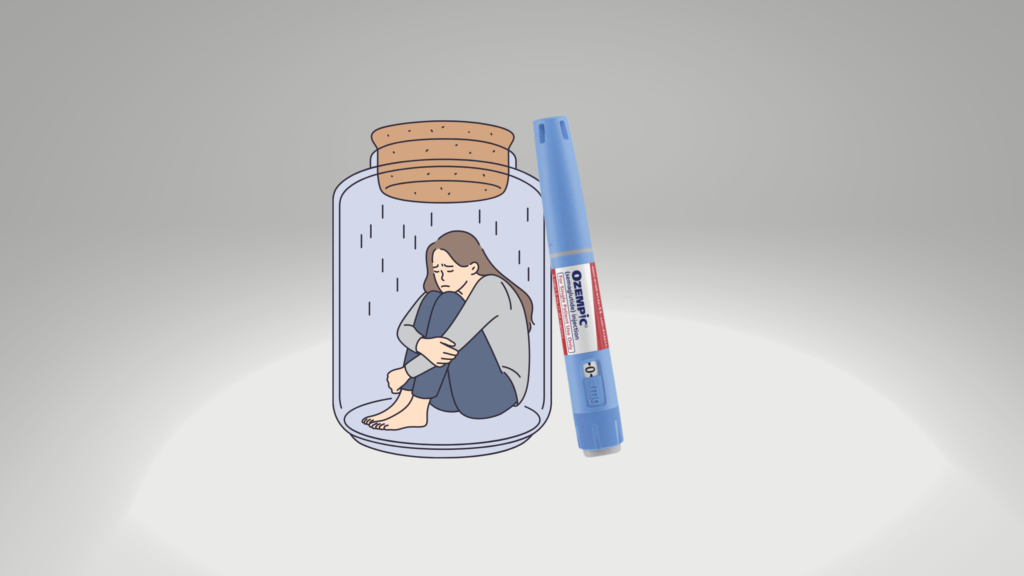The following is a transcript of the “Ozempic Made Me Depressed” video posted on YouTube.
Exploring the Potential Link Between Ozempic and Depression
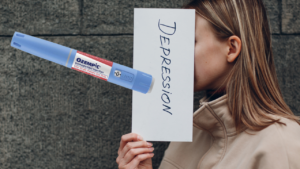 In July, it was announced that the European Union is investigating whether Ozempic or Semaglutide, the molecule inside Ozempic, is linked to or causing depression and suicidal thoughts in some individuals. And I, of course, had a whole pile of you reach out asking me if this was possible or if this was something that they needed to be worried about.
In July, it was announced that the European Union is investigating whether Ozempic or Semaglutide, the molecule inside Ozempic, is linked to or causing depression and suicidal thoughts in some individuals. And I, of course, had a whole pile of you reach out asking me if this was possible or if this was something that they needed to be worried about.
I mean, how can the blockbuster medication that we use for Diabetes and weight management cause depression? And looking at a whole pile of other news stories and everything, there seems to be that people are saying that their life when on Ozempic seems to be more miserable.
They’re showing signs and symptoms of depression, depressed mood, and for some people, they’re showing signs of suicidal ideation. So if this is indeed the case and the current linkage is there, this is something we don’t want to screw around with when it comes to depression, when it comes to thoughts of suicide and potential suicide attempts, we want to make sure that we are taking good care and indeed investigating if there is a linkage here.
Of course, whenever something like this comes up, the big question is, “How could this medication be leading to this? What is the mechanism? Is there something else going on here that we haven’t picked up? If so, what do we need to do about it?”
How Ozempic’s Action on GLP-1 Receptors Connects to Mental Health
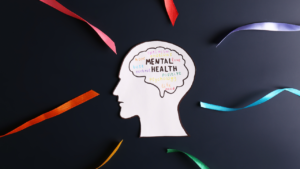 Ozempic or Semaglutide is a GLP-1 receptor agonist which mimics the hormone GLP-1 that our body naturally produces. Our body will produce GLP-1 in response to food coming into the system. So when you eat a meal, GLP-1 gets released from your intestines, and it goes out, and it helps to regulate and give you that feeling of fullness or satiety and gets you to stop eating. It also helps to regulate and manage your blood sugar levels after a meal and brings them down to a normal level again.
Ozempic or Semaglutide is a GLP-1 receptor agonist which mimics the hormone GLP-1 that our body naturally produces. Our body will produce GLP-1 in response to food coming into the system. So when you eat a meal, GLP-1 gets released from your intestines, and it goes out, and it helps to regulate and give you that feeling of fullness or satiety and gets you to stop eating. It also helps to regulate and manage your blood sugar levels after a meal and brings them down to a normal level again.

So when it comes to medications like Semaglutide or Ozempic, essentially they’re amplifying the effects of that GLP-1 molecule and providing a greater amount of benefit in terms of satiety and decreasing how much food a person eats as well, more potency in terms of regulating and bringing blood sugars down to a normal level. That is why it can be used to treat Diabetes and Obesity.
In terms of the mechanism around potential depressive-type thoughts and suicidal ideation, we really don’t have any good answers and only a whole pile of speculation. Some of the ideas that have come out are since that Ozempic or Semaglutide acts within the reward centers of your brain, and that’s how it partially helps to decrease your wanting of food and decreases your pleasure from food.
The Nexus of Pleasure, Activities, and Blood Sugar
The idea is that if you’re no longer getting pleasure from food or the foods that you like eating or even just regular food in general, and that definitely could have a negative effect on your mental health. Further, some individuals have reported that they’re not getting any pleasure from food; they are also not getting any pleasure from their usual activities that they used to enjoy, activities that had nothing to do with eating whatsoever.
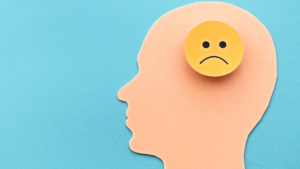
So if you suddenly are not getting pleasure from your daily activities and hobbies, such is problematic and could negatively affect your mood. Other ideas have had to do more with blood sugars and nutrition and stuff like that in the sense that since Ozempic helps to regulate your blood sugar levels and brings them down to a lower level, blood sugar or sugar is essentially the fuel for your body, and if you have less fuel in the system, maybe you’re going to have less energy, be more tired, fatigued, and that sort of thing.
Same thing with how Ozempic decreases how much an individual will eat. Well, maybe what’s happening is that people are not getting adequate nutrition, which could be leading to fatigue, tiredness, and a depressed mood. However, when we take a step back and look at the broader literature on weight loss, particularly significant amounts of weight loss, depression and suicide risk, or suicidal ideation really isn’t necessarily new.
Contextualizing Mental Health in Weight Management
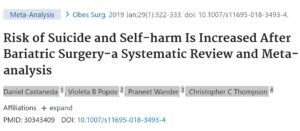 In fact, in this meta-analysis from 2018 here, individuals that underwent bariatric surgery lost a significant amount of weight and were found to have a suicide rate two times higher than BMI-matched controls after the surgery. Also, they were found to have rates of suicide and self-harm attempts that were four times higher than the control group.
In fact, in this meta-analysis from 2018 here, individuals that underwent bariatric surgery lost a significant amount of weight and were found to have a suicide rate two times higher than BMI-matched controls after the surgery. Also, they were found to have rates of suicide and self-harm attempts that were four times higher than the control group.
So experiencing depression and suicidal thoughts and everything in that sense of things is a concern and something we see in the broader population of individuals undergoing various weight loss and weight management treatments. The authors of this paper highlighted a whole pile of different ideas, thoughts, and mechanisms as to what could be going on here. Everything from physiological changes due to the surgery to not properly screening for mental health conditions before the surgery, and things like that.

One thing they highlighted, and I certainly want to highlight it here, is the social and psychosocial factors of things, particularly the aspect of unmet expectations. You see, what has been found is that for individuals that are undergoing either weight-loss surgery or going on weight-loss medication, the expectation that individuals have for the amount of weight that is going to be lost tends to be much higher than the amount of weight that we clinically expect.
This is something that I see every single day in my practice. People tend to have unrealistic expectations about not only the amount of weight they’re going to lose but also the rate at which they’re going to lose weight. That is what I spend the vast majority of my time doing, helping people manage these expectations and get a more realistic understanding of what is and is not possible.
This further helps people realize that they’re their own individual, and they can’t compare themselves to someone on Facebook who lost 80 pounds in one week because you don’t know what they’re doing or how they’re doing it. And hey, they have an entirely different set of genetics, body and life experiences compared to you.
The Weight of Expectations
 Now, why am I highlighting this aspect of unmet expectations? You wouldn’t think it would be all that much of a big deal, like, heck, you just didn’t reach the weight you wanted. What’s the big deal? Why would you become depressed and start having suicidal thoughts?
Now, why am I highlighting this aspect of unmet expectations? You wouldn’t think it would be all that much of a big deal, like, heck, you just didn’t reach the weight you wanted. What’s the big deal? Why would you become depressed and start having suicidal thoughts?
Not only do unmet expectations lead to things like disappointment and frustration, but when it comes to individuals with obesity who have spent their entire life struggling with their weight, they have a great deal of internalized weight bias. So when an individual doesn’t reach their goal weight or doesn’t lose weight at the rate they expect, they turn inwards. Instead of looking at what they’re doing and it not working, they turn inwards on themselves and say, well, what am I doing wrong? Why am I the problem? Why is this my fault?
 Unfortunately, many people spend so much time obsessing about the number on the scale and ultimately obsessing about things they can’t control, like how quickly their bodies will lose fat. So if you are constantly trying to control something you can’t control, well, you’ll lose your effing mind.
Unfortunately, many people spend so much time obsessing about the number on the scale and ultimately obsessing about things they can’t control, like how quickly their bodies will lose fat. So if you are constantly trying to control something you can’t control, well, you’ll lose your effing mind.
When we look at mental illness, the foundation of anxiety is essentially a feeling that you have no control over, and if you constantly feel like you have no control over a situation, if you keep trying to make changes and keep trying to do these things and are not seeing any kind of results, well, eventually, you’re going to give up hope.
Navigating the Path Forward
 Eventually, you will feel hopeless, and what is the foundation of depression? Well, it’s a loss of hope. People begin to ask, what is the point of it all? What I hope this highlights is that unmet expectations could certainly lead down the spiral of developing a mental health disorder of depression and maybe even going as far as things like suicidal ideation and potentially attempting suicide.
Eventually, you will feel hopeless, and what is the foundation of depression? Well, it’s a loss of hope. People begin to ask, what is the point of it all? What I hope this highlights is that unmet expectations could certainly lead down the spiral of developing a mental health disorder of depression and maybe even going as far as things like suicidal ideation and potentially attempting suicide.
Now, again, we don’t have a lot of concrete evidence and data in this regard. I’m very excited to see what comes out of these investigations and what we can tease out of them as well. The things that I’m talking about here are partially speculation but also from my clinical experience and what I’ve heard from my other colleagues, and very likely, there will be some differences and some other factors at play. Unfortunately, as always, that means we will need more research and data. But as that research and data come out, I will share it with all of you.
 In the meantime, though, we can for sure do things as clinicians: we can do better screening before and monitoring during treatment to ensure that our patients continue to be successful and aren’t developing any mental health concerns.
In the meantime, though, we can for sure do things as clinicians: we can do better screening before and monitoring during treatment to ensure that our patients continue to be successful and aren’t developing any mental health concerns.
As for patients that might be thinking about or are currently taking these medications, please, if you’re noticing any changes in your mood or mental health, be sure to follow up with your primary care team as well. Continue to reach out to friends, family and the support in your life and let them know what’s going on and if you are experiencing these changes.
Shifting Focus: Embracing Health-Driven Goals
And finally, as a society, we can continue to try and move away from the goddamn scale and the numbers that we can’t control there and start to focus more on goals and things that are well going to bring health and are really what are the essential things in terms of life and our well being—so moving away from those goals of the things you can’t control and moving towards the things and the goals you can control.
 All right, that is it, and that is all you beautiful people. I hope that provides a little bit of insight and information around kind of what might be going on here. Again, we don’t have all the answers, and more concrete data is needed. But in the meantime, be sure to stay safe.
All right, that is it, and that is all you beautiful people. I hope that provides a little bit of insight and information around kind of what might be going on here. Again, we don’t have all the answers, and more concrete data is needed. But in the meantime, be sure to stay safe.
And, of course, if you got some value out of this, please like, share, subscribe and spread the news out to the world. And of course, if you have any questions, drop them down in the comments below, and I will do my best to answer them.
Until next time, you beautiful people. Always remember that small tweaks lead to massive peaks.
—
References:
NIH. Daniel Castaneda, Violeta B Popov, Praneet Wander, Christopher C Thompson. (2018). Risk of Suicide and Self-harm Is Increased After Bariatric Surgery-a Systematic Review and Meta-analysis. Retrieved from: https://pubmed.ncbi.nlm.nih.gov/30343409/
—
 Dr. Dan
Dr. Dan
Follow me on social media for regular updates – @TheOfficialDrDan
Subscribe to my newsletter for a heads-up on all new content.
Sharing is caring! Here’s the link for social, email, and even text – https://healthevolved.co/ozempic-depressed.
If you need some coaching support on your weight management journey, you can book a consultation with me to see if you’d be a good fit for our program.
Questions or comments? Please send them my way on our Contact Us page!

